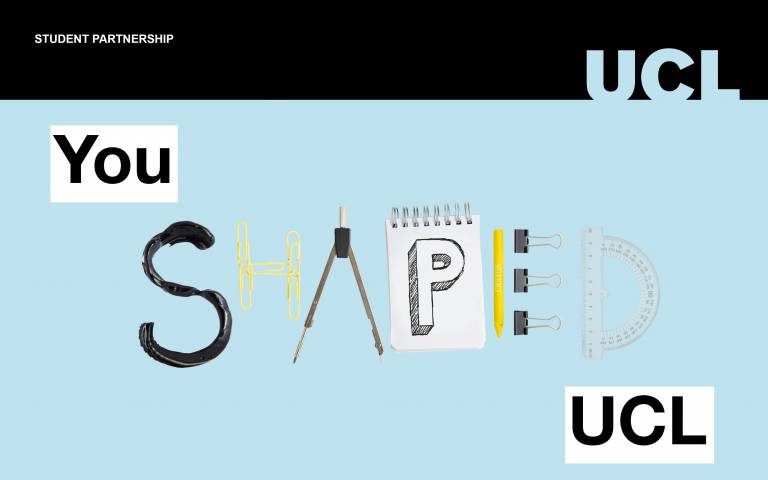Show students how we’re improving with You Shaped UCL
11 December 2019
The You Shaped UCL campaign can help you close the feedback loop with students by highlighting changes inspired by their views.

The You Shaped UCL campaign is designed to help departments and faculties show students how their feedback has contributed to local changes, along with highlighting institutional improvements such as the opening of the Student Centre.
UCL-wide changes will be promoted to students via a poster campaign and social media, as well as the updated You Shaped UCL video.
Departments are welcome to share the major changes featured on the campaign’s landing page, and can also feature local initiatives by using the customisable templates put together by the Student Partnership team.
Tell your students about local changes
Contacting your students with details of these local changes is particularly effective, as students tend to feel a strong sense of connection to their department, school or division.
Promoting local initiatives to improve the student experience may also drive higher scores for your department in response to question 25 within the National Student Survey (NSS). This asks final-year undergraduates to what extent ‘it is clear how students’ feedback on the course has been acted on’.
Departments such as History of Art and the Division of Psychiatry and Language Sciences achieved impressive rises in scores for NSS question 25 after requesting last year’s You Shaped UCL materials and running their own “closing the loop” campaigns. The departments’ scores for question 25 rose seven and 20 points respectively in the 2019 NSS.
Running your own campaign
To run a You Shaped UCL campaign in your department, the Student Partnership team has also created a guide to launching your own, tailored “closing the loop” campaign, outlining the key actions involved.
These include:
1. Create a list of specific changes
Consult key staff such as module leads and chairs of Staff-Student Consultative Committees (SSCCs) to help you collate a list of the specific changes that have happened in your area during the last year, in response to student feedback.
2. Choose 3-5 of your best initatives
Refine your list and seek senior staff approval. We recommend picking 3-5 strong initiatives that demonstrate an improvement to the local student experience. Last year, for example, the UCL School of Pharmacy’s campaign included: ‘You asked for prompt feedback on your work. The School of Pharmacy policy is now to return coursework within three weeks; a week earlier than UCL policy.’
3. Identify the right channels to tell your students
Identify the most effective channels in your area to share your feedback with students. That could include poster boards, digital TV screens in public areas, your website, Facebook page or a Staff-Student Consultative Committee (SSCC) Moodle page. We’d recommend liaising with your faculty or departmental communications team for their guidance.
4. Use face-to-face communications
Alongside written communications, face-to-face communication with your students is an effective way to spread the news. Think about existing forums such as SSCCs and Departmental Teaching Committees as well as lecture shout outs. Involving your Student Reps is key – perhaps they would be willing join a lecture to highlight a few key initiatives or changes? You could also consider new events or forums to reach the wider student community, for instance an end of term or Christmas celebration.
5. Start early/mid-December
Start promotion of your local You Shape UCL campaign in early or mid-December, to coincide with the wider UCL campaign and ensure as many students as possible know their voice is being heard.
 Close
Close

